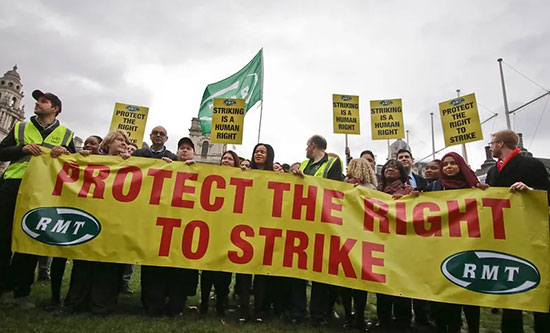
The wave of strikes which started with the Rail, Maritime and Transport Workers (RMT) union on 21 June has now excited the political attention of the candidates for the leadership of the Tory Party, with Liz Truss promising further anti-trade union legislation. Labour leader Sir Keir Starmer then sacked a junior shadow transport minister, Sam Tarry, for joining a picket line on 27 July. Further strikes on the railways, in the Royal Mail and BT are taking place over the summer as workers fight for wage increases in line with soaring inflation.
Liz Truss’s extreme ambition means she will offer anything to the Tory Party electorate which will chime with its reactionary contempt for the working class. Following the success of the RMT and now ASLEF strikes in closing down the rail network, Truss has stated the need to make the already oppressive anti-trade union laws even more stringent. In particular she has pledged to bring new legislation forward within 30 days of becoming prime minister. Measures this would reportedly include are:
- Making minimum service levels during strike action legally enforceable across the public sector – this could cover health and education as well as the railway system;
- Upping the threshold on strike ballots to 50% of the membership involved rather than the current 40%;
- Lengthier lead times between a successful ballot and strike action starting – from two weeks to four. This would make it easier for employers to recruit agency staff to replace strikers, a move recently made legal by the government;
- Limits on the number of strikes that can take place in the six months after a ballot.
Truss is the likely victor in the race to become Tory Party leader, and this anti-union sentiment will go down well with the Tory Party electorate which is already two to one in her favour as we go to press. Transport Secretary Grant Shapps has weighed in, saying ‘we need to do more to remove the power of these very militant, extreme-Left unions from disrupting everyday lives of ordinary people.’ RMT leader Mick Lynch described the proposals as ‘the biggest attack on trade union and civil rights since labour unions were legalised in 1871’, adding ‘Truss is proposing to make effective trade unionism illegal in Britain and to rob working people of a key democratic right. If these proposals become law, there will be the biggest resistance mounted by the entire trade union movement, rivalling the General Strike of 1926, the Suffragettes and Chartism.’ However, since a general strike would be regarded as a political strike, illegal under existing anti-trade union laws, it is highly unlikely that trade union leaders will risk their unions’ huge assets or their personal liability in a campaign of strike action.
While Truss has been whipping up anti-union sentiment with the willing support of the media, Labour leader Sir Keir Starmer has been disciplining his shadow cabinet members over public expressions of support for the strikes, undeterred by the high level of popular agreement with RMT actions. Prior to the first RMT strike, he had ordered front bench MPs not to join RMT picket lines. Shadow foreign secretary David Lammy added that joining picket lines was not something a serious party of government should do. UNITE general secretary Sharon Graham replied that ‘It is now down to the trade unions to defend working people. We are their only voice.’
When baggage handlers at Heathrow Airport threatened to go on strike to get a 10% wage cut during the height of the pandemic rescinded, Lammy denounced them in a TV interview. Graham described it as a ‘new low’ for Labour which could not ‘be relied on by working people’. Lammy was later forced to apologise for his ‘misunderstanding’ the reasons for the baggage handlers’ dispute – implying that had workers actually been demanding a 10% wage rise due to rising rates of inflation this would be quite unreasonable. After a further RMT strike on 27 July, Starmer sacked shadow transport minister Sam Tarry for joining a picket line and saying it was ‘not acceptable to offer below inflation pay rises’ because it would mean a real-terms pay cut. This basic class standpoint was deemed an unacceptable policy statement. Starmer’s action has put the Labour left in a tizzy, complaining that the leader was taking their votes and support for granted. Well, yes, he quite rightly does – the Labour left has made it clear that however much they whinge they are not breaking with their reactionary, anti-working class party.
The numerous ballots for strike action, and the actions already taken by railway, Royal Mail and BT workers are a welcome change from the supine response by trade unions over the past decade to austerity. But whatever trade union leaders say, they will try to avoid an escalation of action which could spiral out of their control or threaten union assets. They will rely on the generally conservative character of trade union members: they are relatively old (41% are over 50 years old, only a quarter under the age of 35), and are relatively privileged when compared to the increasing numbers of precarious workers: nearly half have worked for the same employer for 10 years or more, and nearly one in four have 20 years’ service. Now only one in eight trade unionists work in the private sector: most trade unionists are relatively well-paid degree-or-equivalent-educated professionals in the public sector. Given that trade union members are a minority of the working class the question remains: how are the mass of low-paid workers, many in very precarious conditions, going to organise to defend their living standards in a period of rampant inflation?
Pete Lynch and Robert Clough




